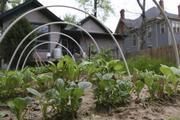LITTLE ROCK — Money may not literally grow on trees, but plant retailers say more folks than usual around central Arkansas are toying with the idea of starting a garden to save some cash.
Even by the first week in April - still not out of the woods as far as a late freeze and thus a little too early for a lot of produce - customers, including many first-time gardeners, were already calling about plants, soil and gardening-related implements, retailers said.
"Definitely there has been an increased interest," said Richard Clever of Arkansas Plant Outlet in Conway by phone last week. "Tomatoes and peppers, the sales are off the charts and it's still early."
Joe Rogers of The Good Earth in west Little Rock reported much the same.
"At this point it's still a little early : but we've had a lot of folks call in asking about [things like] what kind of soil is needed for a raised bed," he said.
What exactly is driving the higher-than-normal consumer interest in vegetable and herb gardening isn't easy to pin down, both retailers said. After all, most people don't go the extra mile of explaining they're getting into gardening because of the economic pinch, but "you get a sense that that's what it is," Clever said.
But, with start up costs to buy plants, soil and tools, is there really a savings to be had by growing your own?
For herbs, yes, said Clever and Rogers. Because they don't take a lot of room, can grow indoors and out, and provide a lot of bang for the buck, fresh grown herbs are a great money-saving alternative to the sometimes pricey options on the store shelves, both retailers said.
"With rosemary : you can clip from it weekly and it won't hurt it at all," Clever said. "It will help it, actually."
But the same sort of savings realization doesn't necessarily come from a vegetable garden.
"It depends on how you go about it," Clever said. "If you use home grown compost and natural fertilizer - say if you've got a neighbor who is a farmer and can use manure - and you've built an economical raised bed, then yes."
On the other hand, you're going to spend a lot of money if you stock up on the biggest, baddest commercial fertilizers, buy one of every tool on the market or try to do too much and end up overtaxing yourself or your garden.
"You've got to be realistic and make the space useful for what you have," Clever said.
Though every bed will be different, Rogers said a reasonable ballpark for a 10-foot by 10-foot raised bed would be between $100 and $200, depending on how deep you want the soil to be and what you spend on the lumber to build it. Going into the ground could lessen the investment, but the advantage of the raised bed, he said, is that it allows for better control of the soil mixture and drainage.
And while it is possible to make the money back from either in the long run, Rogers pointed out that strictly growing your own veggies is going to leave you wanting for them come winter.
"So you're never going to do away with the market entirely, and it has its place," he said.
So he advised that finances alone probably shouldn't drive you to plant your own produce.
"I think probably more so than what you save, there's the satisfaction factor," Rogers said. "There is just something about going out into the garden : and having the satisfaction of saying, 'I grew this.'"
Easy-to-grow plants for novices
Whether for savings or satisfaction, the hardest part of getting started for the newbie gardener is usually deciding what and how much to plant.
Veteran gardeners Gerald Cound and Pam Choate, who work with the community garden sponsored by the Hoover United Methodist Church at 12th and Oak streets in Little Rock, say the first step is to start small, maybe only one or two plants in a 15-foot by 15-foot bed with good soil. Success with that will build confidence in expanding the garden, and you'll have room to grow.
As for easy-to-care-for plants that provide the most bang for the buck, Cound suggested:
Tomatoes - Versatile in use and able to be replanted late, the tomato is a good starter plant for any garden.
Squash - "It's such a healthy vegetable, and there's a lot of ways you can fix squash," said Cound. Among them: raw, fried, grilled or tossed into casserole or stir fry.
Cucumbers - Can be used in salads or canned and preserved.
Peppers - "There are a lot of different kinds of peppers you can grow," said Cound, naming bell peppers as the most common. But other varieties can add seasonings to everything to eggs to salads.
Potatoes - Again the ease of care and versatility make potatoes a great staple upon which to build a garden.
Of course all these veggies come in lots of different varieties, and some of those will do better than others here in Arkansas - and your best choice won't always be what you find at a big box retailer. For advice on which specific varieties will work best here, Cound suggested consulting the University of Arkansas Cooperative Extension Service (http://division.uaex.edu/), a local garden center or nursery, or gaining some practical experience by volunteering in a community garden.
